The Cambridge History of Japan, Vol. 4: Early Modern Japan
Подождите немного. Документ загружается.

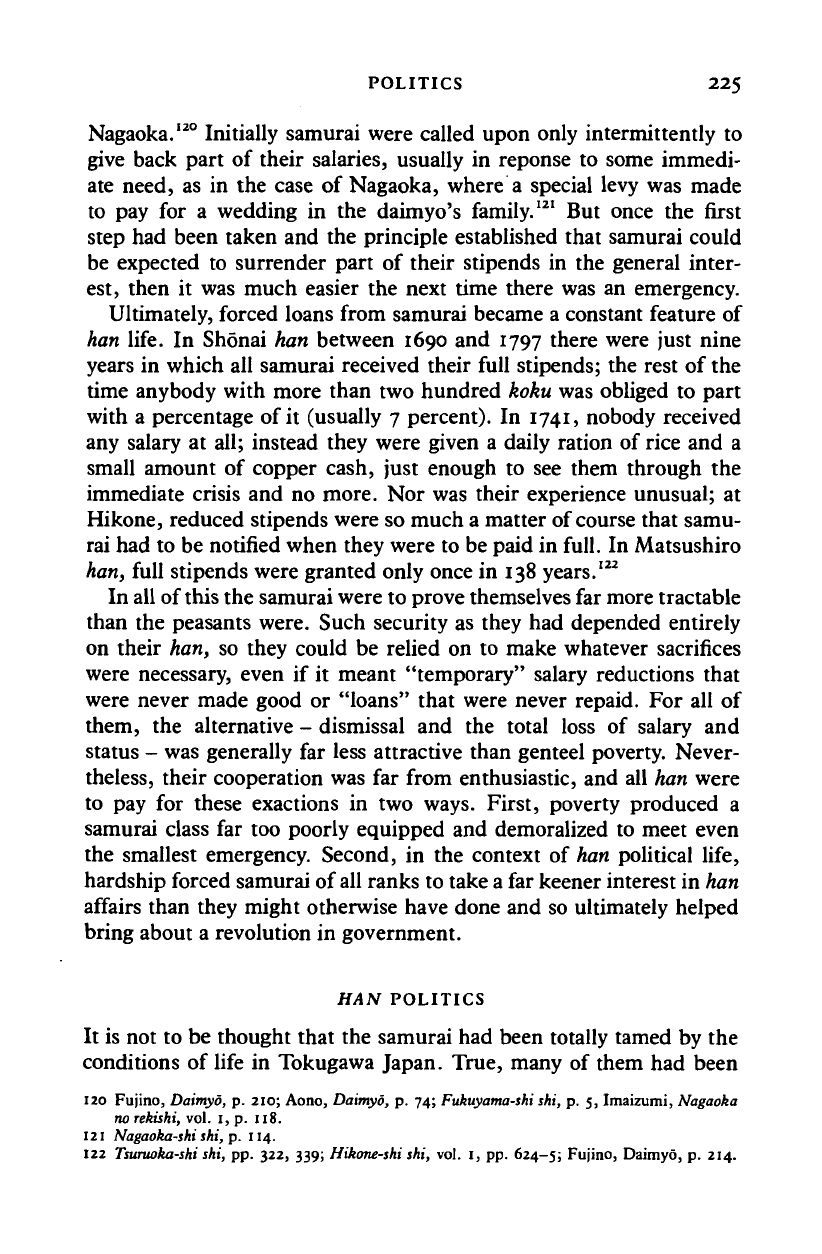
POLITICS 225
Nagaoka.
120
Initially samurai were called upon only intermittently to
give back part of their salaries, usually in reponse to some immedi-
ate need, as in the case of Nagaoka, where a special levy was made
to pay for a wedding in the daimyo's family.
121
But once the first
step had been taken and the principle established that samurai could
be expected to surrender part of their stipends in the general inter-
est, then it was much easier the next time there was an emergency.
Ultimately, forced loans from samurai became a constant feature of
han life. In Shonai han between 1690 and 1797 there were just nine
years in which all samurai received their full stipends; the rest of the
time anybody with more than two hundred koku was obliged to part
with a percentage of it (usually 7 percent). In 1741, nobody received
any salary at all; instead they were given a daily ration of rice and a
small amount of copper cash, just enough to see them through the
immediate crisis and no more. Nor was their experience unusual; at
Hikone, reduced stipends were so much a matter of
course
that samu-
rai had to be notified when they were to be paid in full. In Matsushiro
han,
full stipends were granted only once in 138 years.
122
In all of this the samurai were to prove themselves far more tractable
than the peasants were. Such security as they had depended entirely
on their han, so they could be relied on to make whatever sacrifices
were necessary, even if it meant "temporary" salary reductions that
were never made good or "loans" that were never repaid. For all of
them, the alternative - dismissal and the total loss of salary and
status - was generally far less attractive than genteel poverty. Never-
theless, their cooperation was far from enthusiastic, and all han were
to pay for these exactions in two ways. First, poverty produced a
samurai class far too poorly equipped and demoralized to meet even
the smallest emergency. Second, in the context of
han
political life,
hardship forced samurai of
all
ranks to take
a
far keener interest in han
affairs than they might otherwise have done and so ultimately helped
bring about a revolution in government.
HAN POLITICS
It is not to be thought that the samurai had been totally tamed by the
conditions of life in Tokugawa Japan. True, many of them had been
120 Fujino, Daimyo, p. 210; Aono, Daimyo, p. 74; Fukuyama-thi shi, p. 5, Imaizumi, Nagaoka
no
rekishi,
vol. I, p. 118.
121 Nagaoka-shi shi, p. 114.
122
Tsuruoka-shi
shi, pp. 322, 339; Hikone-shi shi, vol. 1, pp. 624-5; Fujino, Daimyo, p. 214.
Cambridge Histories Online © Cambridge University Press, 2008
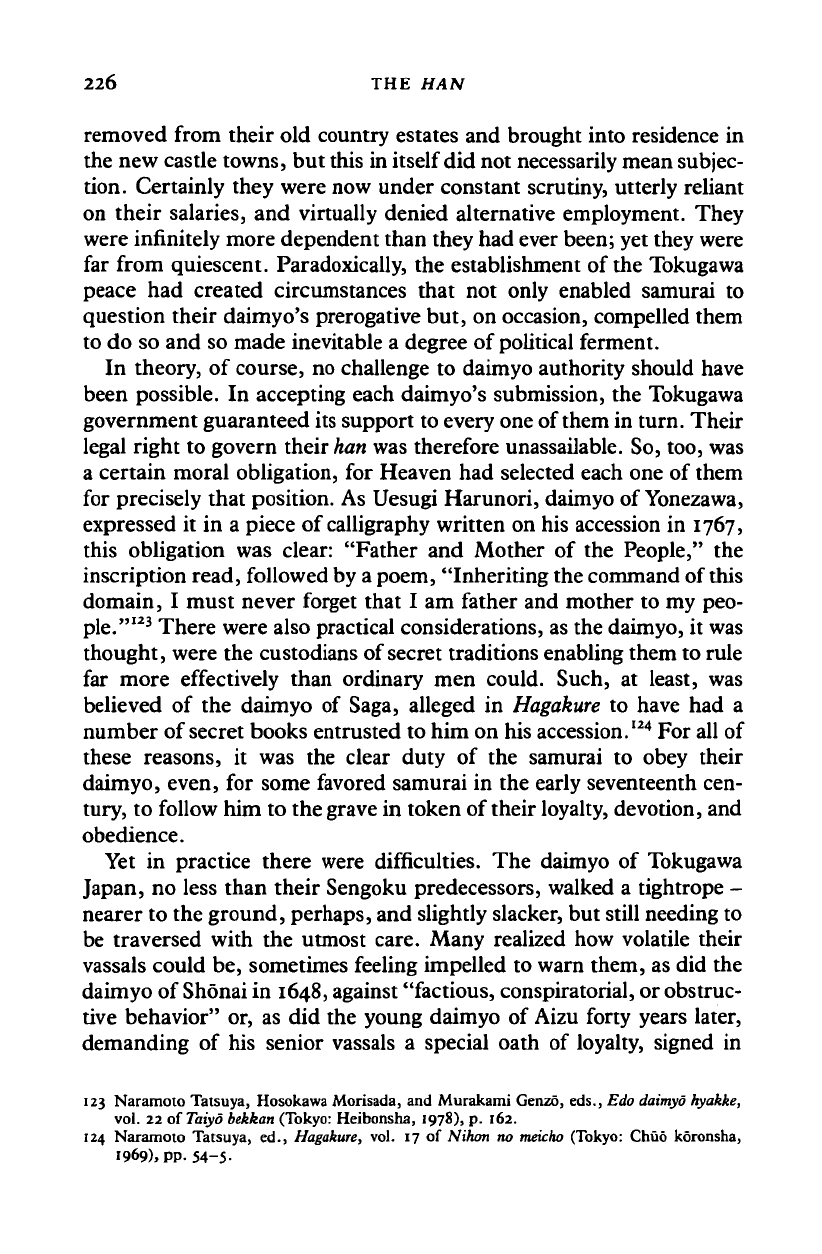
226 THE HAN
removed from their old country estates and brought into residence in
the new castle towns, but this in itself did not necessarily mean subjec-
tion. Certainly they were now under constant scrutiny, utterly reliant
on their salaries, and virtually denied alternative employment. They
were infinitely more dependent than they had ever been; yet they were
far from quiescent. Paradoxically, the establishment of the Tokugawa
peace had created circumstances that not only enabled samurai to
question their daimyo's prerogative but, on occasion, compelled them
to do so and so made inevitable a degree of political ferment.
In theory, of course, no challenge to daimyo authority should have
been possible. In accepting each daimyo's submission, the Tokugawa
government guaranteed its support to every one of them in turn. Their
legal right to govern their
han
was therefore unassailable. So, too, was
a certain moral obligation, for Heaven had selected each one of them
for precisely that position. As Uesugi Harunori, daimyo of Yonezawa,
expressed it in a piece of calligraphy written on his accession in 1767,
this obligation was clear: "Father and Mother of the People," the
inscription read, followed by a poem, "Inheriting the command of this
domain, I must never forget that I am father and mother to my peo-
ple."
123
There were also practical considerations, as the daimyo, it was
thought, were the custodians of secret traditions enabling them to rule
far more effectively than ordinary men could. Such, at least, was
believed of the daimyo of Saga, alleged in
Hagakure
to have had a
number of secret books entrusted to him on his accession.
124
For all of
these reasons, it was the clear duty of the samurai to obey their
daimyo, even, for some favored samurai in the early seventeenth cen-
tury, to follow him to the grave in token of their loyalty, devotion, and
obedience.
Yet in practice there were difficulties. The daimyo of Tokugawa
Japan, no less than their Sengoku predecessors, walked a tightrope -
nearer to the ground, perhaps, and slightly slacker, but still needing to
be traversed with the utmost care. Many realized how volatile their
vassals could be, sometimes feeling impelled to warn them, as did the
daimyo of Shonai in
1648,
against "factious, conspiratorial, or obstruc-
tive behavior" or, as did the young daimyo of Aizu forty years later,
demanding of his senior vassals a special oath of loyalty, signed in
123 Naramoto Tatsuya, Hosokawa Morisada, and Murakami Genzo, eds., Edo daimyo hyakke,
vol. 22 of Taiyo bekkan (Tokyo: Heibonsha, 1978), p. 162.
124 Naramoto Tatsuya, ed., Hagakure, vol. 17 of Nihon no meicho (Tokyo: Chuo koronsha,
1969),
PP- 54-5-
Cambridge Histories Online © Cambridge University Press, 2008
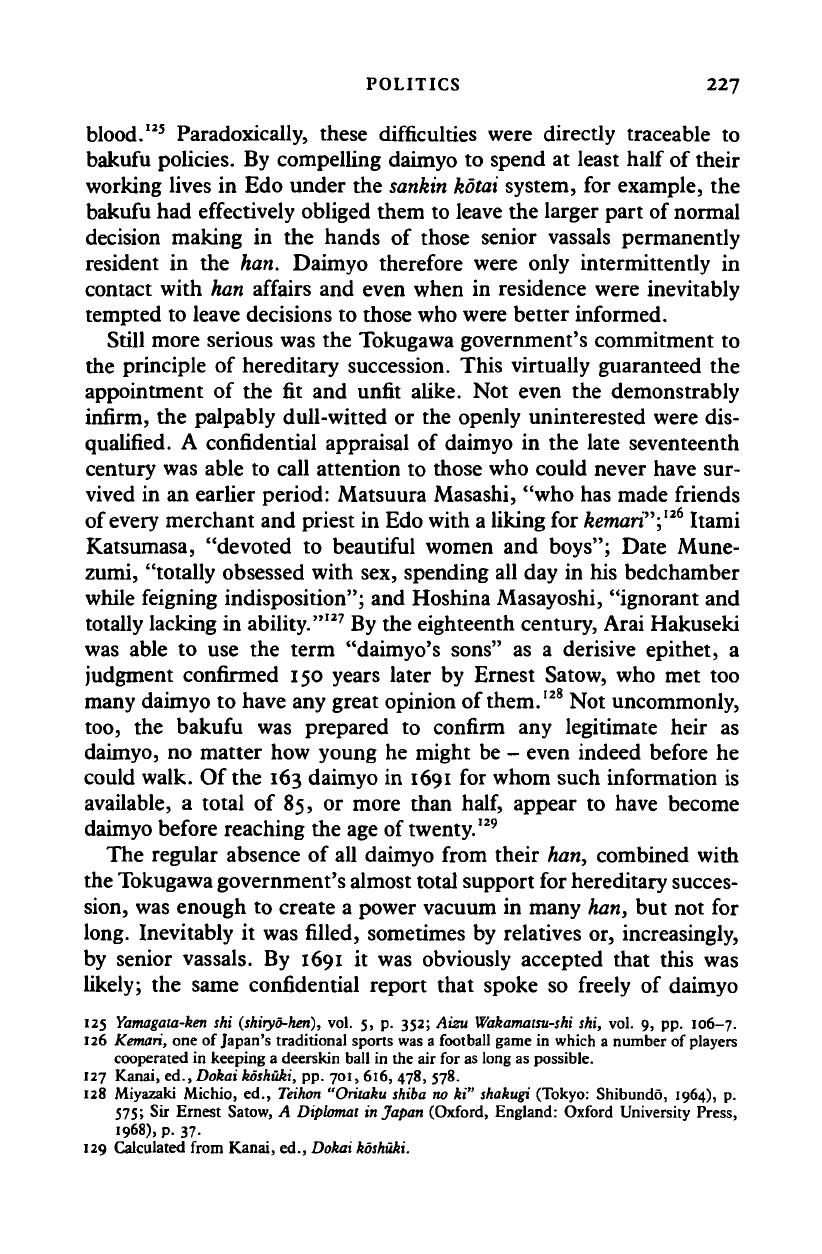
POLITICS 227
blood.
125
Paradoxically, these difficulties were directly traceable to
bakufu policies. By compelling daimyo to spend at least half of their
working lives in Edo under the
sankin
kotai system, for example, the
bakufu had effectively obliged them to leave the larger part of normal
decision making in the hands of those senior vassals permanently
resident in the han. Daimyo therefore were only intermittently in
contact with han affairs and even when in residence were inevitably
tempted to leave decisions to those who were better informed.
Still more serious was the Tokugawa government's commitment to
the principle of hereditary succession. This virtually guaranteed the
appointment of the fit and unfit alike. Not even the demonstrably
infirm, the palpably dull-witted or the openly uninterested were dis-
qualified. A confidential appraisal of daimyo in the late seventeenth
century was able to call attention to those who could never have sur-
vived in an earlier period: Matsuura Masashi, "who has made friends
of every merchant and priest in Edo with a liking for
kemari";
126
Itami
Katsumasa, "devoted to beautiful women and boys"; Date Mune-
zumi, "totally obsessed with sex, spending all day in his bedchamber
while feigning indisposition"; and Hoshina Masayoshi, "ignorant and
totally lacking in ability."
127
By the eighteenth century, Arai Hakuseki
was able to use the term "daimyo's sons" as a derisive epithet, a
judgment confirmed 150 years later by Ernest Satow, who met too
many daimyo to have any great opinion of them.
128
Not uncommonly,
too,
the bakufu was prepared to confirm any legitimate heir as
daimyo, no matter how young he might be - even indeed before he
could walk. Of the 163 daimyo in 1691 for whom such information is
available, a total of 85, or more than
half,
appear to have become
daimyo before reaching the age of twenty.
129
The regular absence of all daimyo from their han, combined with
the Tokugawa government's almost total support for hereditary succes-
sion, was enough to create a power vacuum in many han, but not for
long. Inevitably it was filled, sometimes by relatives or, increasingly,
by senior vassals. By 1691 it was obviously accepted that this was
likely; the same confidential report that spoke so freely of daimyo
125 Yamagata-ken shi (shiryo-hen), vol. 5, p. 352; Aizu
Wakamatsu-shi
shi, vol. 9, pp. 106-7.
126 Kemari, one of Japan's traditional sports was a football game in which a number of players
cooperated in keeping a deerskin ball in the air for as long as possible.
127 Kanai, ed., Dokai koshuki, pp. 701, 616, 478, 578.
128 Miyazaki Michio, ed., Teihon "Oritaku shiba no ki" shakugi (Tokyo: Shibundo, 1964), p.
575;
Sir Ernest Satow, A Diplomat in Japan (Oxford, England: Oxford University Press,
1968),
p. 37-
129 Calculated from Kanai, ed., Dokai
koshuki.
Cambridge Histories Online © Cambridge University Press, 2008

228 THE HAN
shortcomings made this clear: "Leaving the government of one's peo-
ple to senior vassals has both good and bad features," it warned. "It is
good when the vassal puts loyalty first and follows the right path
selflessly and unswervingly. But if the vassal is deceitful and harbors
mischievous designs while counterfeiting loyalty . . . and uses his au-
thority selfishly and unjustly, then that house will surely fall."
130
Equally, other pressures made sure that vassals were not merely able
to supplant their daimyo in all but name but indeed were obliged to.
Political power by itself
was
perhaps not such a prize, offering at the
most a massage for the ego, marginally better living conditions, and
agreeable opportunities for the exercise of
patronage.
But the alterna-
tive,
as far as samurai were concerned, could be disastrous. If a
daimyo, selected by no process more discriminating than the accident
of birth, were to attempt to rule his
han
personally, then who could say
what havoc he might let loose? He might be led by flatterers to over-
turn the traditional samurai hierarchy; he might prove spendthrift; or
he might bankrupt the
han
or even, by attracting Tokugawa displea-
sure,
put his own tenure at risk, and with it that of all his samurai as
well.
The dangers inherent in daimyo autocracy
were
just
too
great
to
allow
samurai, dependent as they were on their han and its well-being, the
luxury of meek obedience. Naturally, they preferred their daimyo to be
ciphers, like the well-loved Makino Tadataka, who became daimyo of
Nagaoka at the age of seventeen. Although he died the following year
and would therefore have had neither the years nor the time to do very
much, his reputation is nevertheless that of a model ruler: "He was
careful not to neglect military matters," the chronicles say, "and was
concerned always for the common people. He instructed his govern-
ment that old ways should be reformed and abuses corrected, that
honest men should be promoted and corrupt officials dismissed. . . .
He knew how to teach his people through the impartial use of severity
and mercy. Conditions improved immediately, and hardships were
thankfully forgotten."
131
Such a daimyo was no trouble to anyone and
therefore was always appreciated. Even those marginally more active
could be controlled with a minimum of effort and within the political
conventions; the only evidence of struggle would then be confined to
ripples on the surface - resignations, dismissals, appointments, and
muted complaints - the last sometimes embodied in appeals to the
130 Ibid., pp. 587-8. 131 Imaizumi, Nagaoka no
rekishi,
vol. I, pp. 82-3.
Cambridge Histories Online © Cambridge University Press, 2008
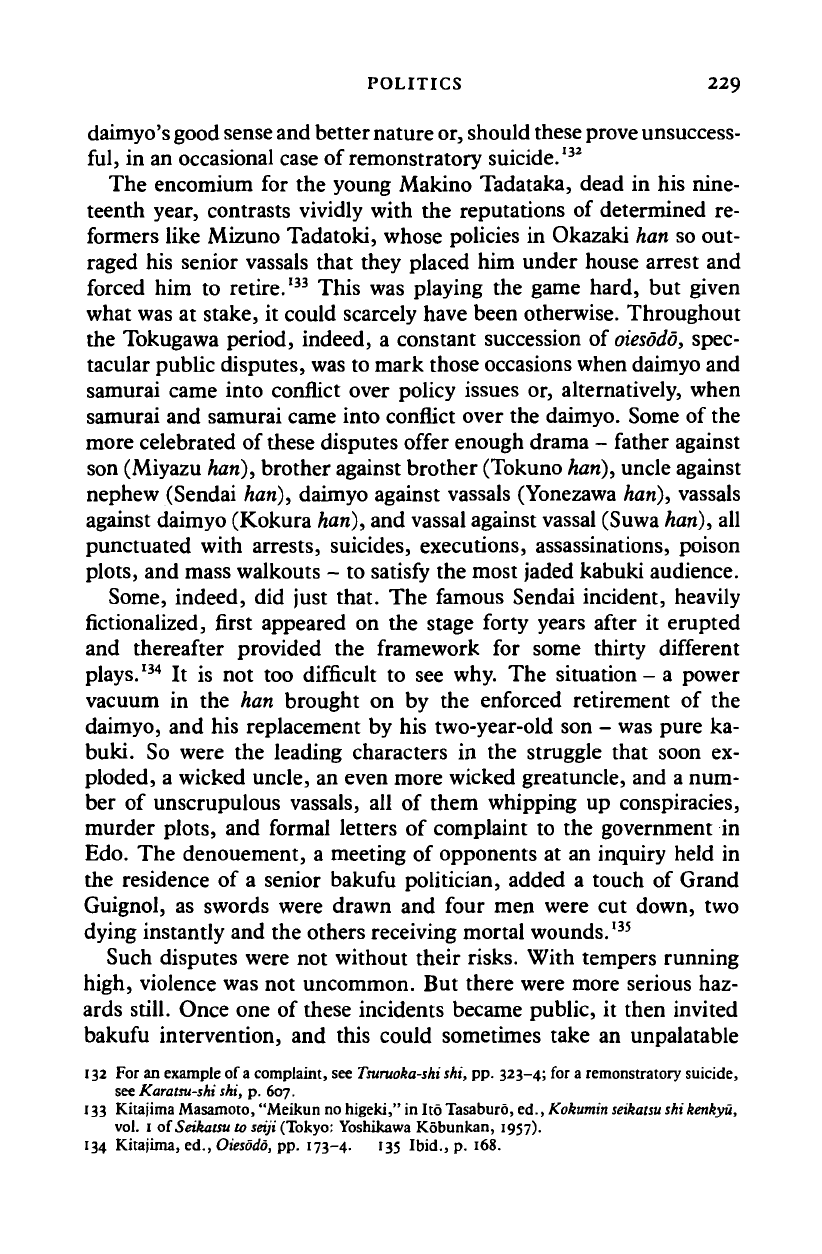
POLITICS 229
daimyo's good
sense
and better nature
or,
should these
prove
unsuccess-
ful,
in an occasional case of remonstratory suicide.
132
The encomium for the young Makino Tadataka, dead in his nine-
teenth year, contrasts vividly with the reputations of determined re-
formers like Mizuno Tadatoki, whose policies in Okazaki han so out-
raged his senior vassals that they placed him under house arrest and
forced him to retire.
133
This was playing the game hard, but given
what was at stake, it could scarcely have been otherwise. Throughout
the Tokugawa period, indeed, a constant succession of
oiesodo,
spec-
tacular public disputes, was to mark those occasions when daimyo and
samurai came into conflict over policy issues or, alternatively, when
samurai and samurai came into conflict over the daimyo. Some of the
more celebrated of these disputes offer enough drama - father against
son (Miyazu han), brother against brother (Tokuno
han),
uncle against
nephew (Sendai han), daimyo against vassals (Yonezawa han), vassals
against daimyo (Kokura
han),
and vassal against vassal (Suwa
han),
all
punctuated with arrests, suicides, executions, assassinations, poison
plots,
and mass walkouts - to satisfy the most jaded kabuki audience.
Some, indeed, did just that. The famous Sendai incident, heavily
fictionalized, first appeared on the stage forty years after it erupted
and thereafter provided the framework for some thirty different
plays.
134
It is not too difficult to see why. The situation- a power
vacuum in the han brought on by the enforced retirement of the
daimyo, and his replacement by his two-year-old son - was pure ka-
buki. So were the leading characters in the struggle that soon ex-
ploded, a wicked uncle, an even more wicked greatuncle, and a num-
ber of unscrupulous vassals, all of them whipping up conspiracies,
murder plots, and formal letters of complaint to the government in
Edo.
The denouement, a meeting of opponents at an inquiry held in
the residence of a senior bakufu politician, added a touch of Grand
Guignol, as swords were drawn and four men were cut down, two
dying instantly and the others receiving mortal wounds.
135
Such disputes were not without their risks. With tempers running
high, violence was not uncommon. But there were more serious haz-
ards still. Once one of these incidents became public, it then invited
bakufu intervention, and this could sometimes take an unpalatable
132 For an example of
a
complaint, see
Tsuruoka-shi
shi, pp. 323-4; for a remonstratory suicide,
see Karatsu-shi shi, p. 607.
133 Kitajima Masamoto, "Meikun no higeki," in I to Tasaburo, ed.,Kokumin
seikatsu
shikenkyu,
vol. 1 of
Seikatsu
to seiji (Tokyo: Yoshikawa Kobunkan, 1957).
134 Kitajima, ed., Oiesodo, pp. 173-4. 135 Ibid., p. 168.
Cambridge Histories Online © Cambridge University Press, 2008

230 THE HAN
form, as Edo did not usually approve of troublemakers, and execution
or exile was not uncommon. Still more serious, the bakufu could
interpret such events as proof of a han's inability to govern itself and
issue a confiscation order. This was precisely the way in which the
Mogami of Yamagata, the Hiraoka of Tokuno, the Matsudaira of
Echigo, and the Kyogoku of Miyazu came to lose their domains, and
how Morioka and Koriyama han both came to be split in two. That
samurai were prepared to take such risks indicates just how seriously
they viewed their political role. No matter how great the possible
perils of action, the probable penalties of inaction were often greater
still.
Some degree of conflict is inevitable in politics. Without it, indeed,
what we know as politics would cease to exist. But it must be acknowl-
edged that certain aspects of han government, by their very secrecy
and inefficiency, tended to invite disagreement among the overwhelm-
ing majority of samurai, who being ineligible for high office, were not
privy to the reasoning of those who were. No han could prevent its
vassals questioning its policies, although many felt obliged to try from
time to time, as did Nakatsu, which in 1738 forbade its samurai even
to discuss any of the new domain laws.
136
Nearly a hundred years
earlier Ikeda Mitsumasa of Okayama had put the position still more
bluntly, warning that "anyone who interferes in any government busi-
ness whatsoever is not a samurai; he is a malefactor, even if he is our
vassal.'"
37
Given the rules governing selection for
han
office through-
out most of the Tokugawa period, a certain measure of discontent was
unavoidable, for as with the positions of emperor, shogun, and
daimyo, those of senior officials in the
han
had also largely come to be
filled by reason of birth. In the wars of the Sengoku period it was
usually the case that no man could hold for very long an office he was
incapable of filling successfully, but here too, the Tokugawa peace had
intervened.
By the middle of the seventeenth century, or even earlier, the samu-
rai hierarchy in most han had been stabilized. The head of each samu-
rai family had been allotted a stipend (whether or not he always re-
ceived it all) that served as an index of his status in the
han,
and this in
turn determined his eligibility for positions in the han military and
administrative hierarchy. The fine calibration to be seen among the
samurai of Sakura han can serve as a fairly typical example of the
136 Kuroya Naofusa, Nakatsu-han
shi
(Tokyo: Hekiun-so, 1940), p. 322.
137 Taniguchi, Okayama han, p. 55.
Cambridge Histories Online © Cambridge University Press, 2008
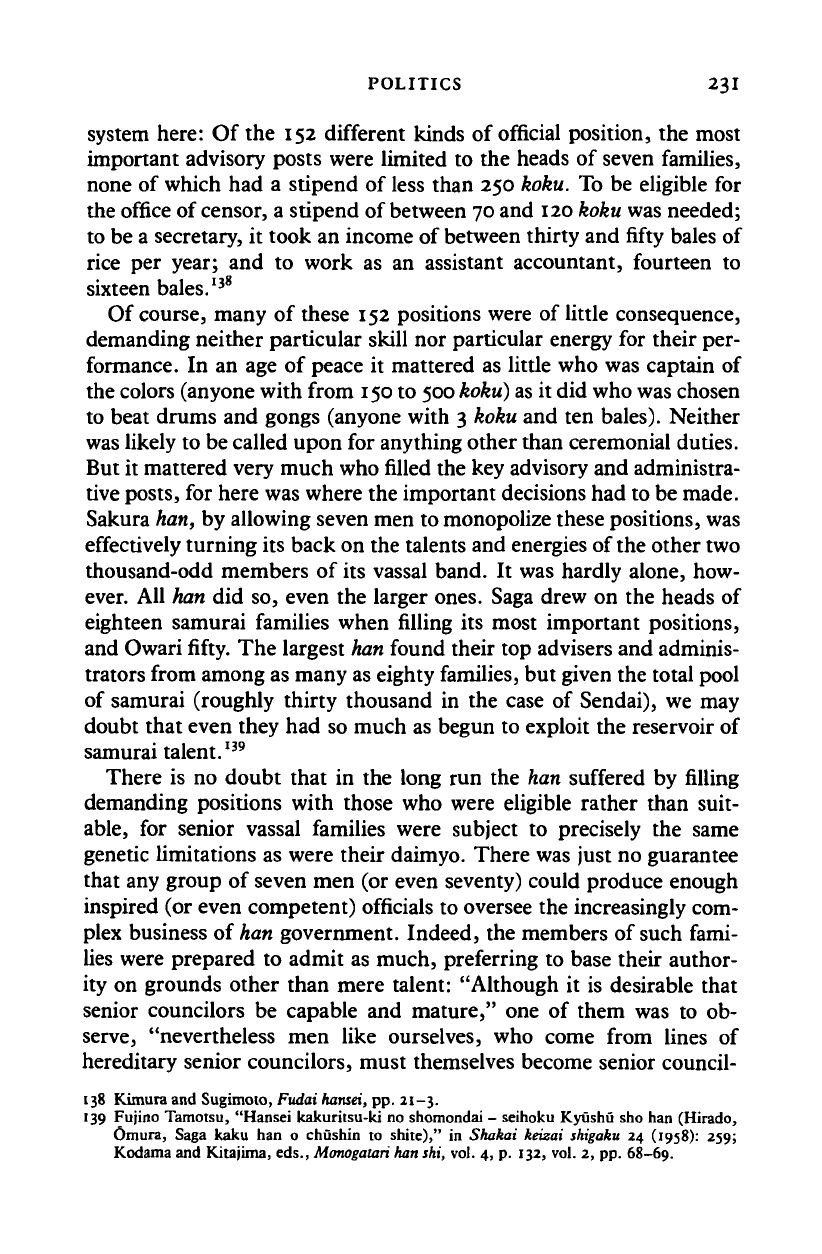
POLITICS 23I
system here: Of the 152 different kinds of official position, the most
important advisory posts were limited to the heads of seven families,
none of which had a stipend of less than 250 koku. To be eligible for
the office of censor, a stipend of between 70 and
120 koku
was needed;
to be a secretary, it took an income of between thirty and fifty bales of
rice per year; and to work as an assistant accountant, fourteen to
sixteen bales.
138
Of course, many of these 152 positions were of little consequence,
demanding neither particular skill nor particular energy for their per-
formance. In an age of peace it mattered as little who was captain of
the colors (anyone with from 150 to 500
koku)
as it did who was chosen
to beat drums and gongs (anyone with 3 koku and ten bales). Neither
was likely to be called upon for anything other than ceremonial duties.
But it mattered very much who
filled
the key advisory and administra-
tive posts, for here was where the important decisions had to be made.
Sakura
han,
by allowing seven men to monopolize these positions, was
effectively turning its back on the talents and energies of the other two
thousand-odd members of its vassal band. It was hardly alone, how-
ever. All han did so, even the larger ones. Saga drew on the heads of
eighteen samurai families when filling its most important positions,
and Owari fifty. The largest
han
found their top advisers and adminis-
trators from among as many as eighty families, but given the total pool
of samurai (roughly thirty thousand in the case of Sendai), we may
doubt that even they had so much as begun to exploit the reservoir of
samurai talent.
139
There is no doubt that in the long run the han suffered by filling
demanding positions with those who were eligible rather than suit-
able,
for senior vassal families were subject to precisely the same
genetic limitations as were their daimyo. There was just no guarantee
that any group of seven men (or even seventy) could produce enough
inspired (or even competent) officials to oversee the increasingly com-
plex business of
han
government. Indeed, the members of such fami-
lies were prepared to admit as much, preferring to base their author-
ity on grounds other than mere talent: "Although it is desirable that
senior councilors be capable and mature," one of them was to ob-
serve, "nevertheless men like ourselves, who come from lines of
hereditary senior councilors, must themselves become senior council-
138 Kimura and Sugimoto, Fudai
hansei,
pp. 21-3.
139 Fujino Tamotsu, "Hansei kakuritsu-ki no shomondai - seihoku Kyushu sho han (Hirado,
Omura, Saga kaku han o chushin to shite)," in Shakai keizai shigaku 24 (1958): 259;
Kodama and Kitajima, eds., Monogalan
han
shi, vol. 4, p. 132, vol. 2, pp. 68-69.
Cambridge Histories Online © Cambridge University Press, 2008
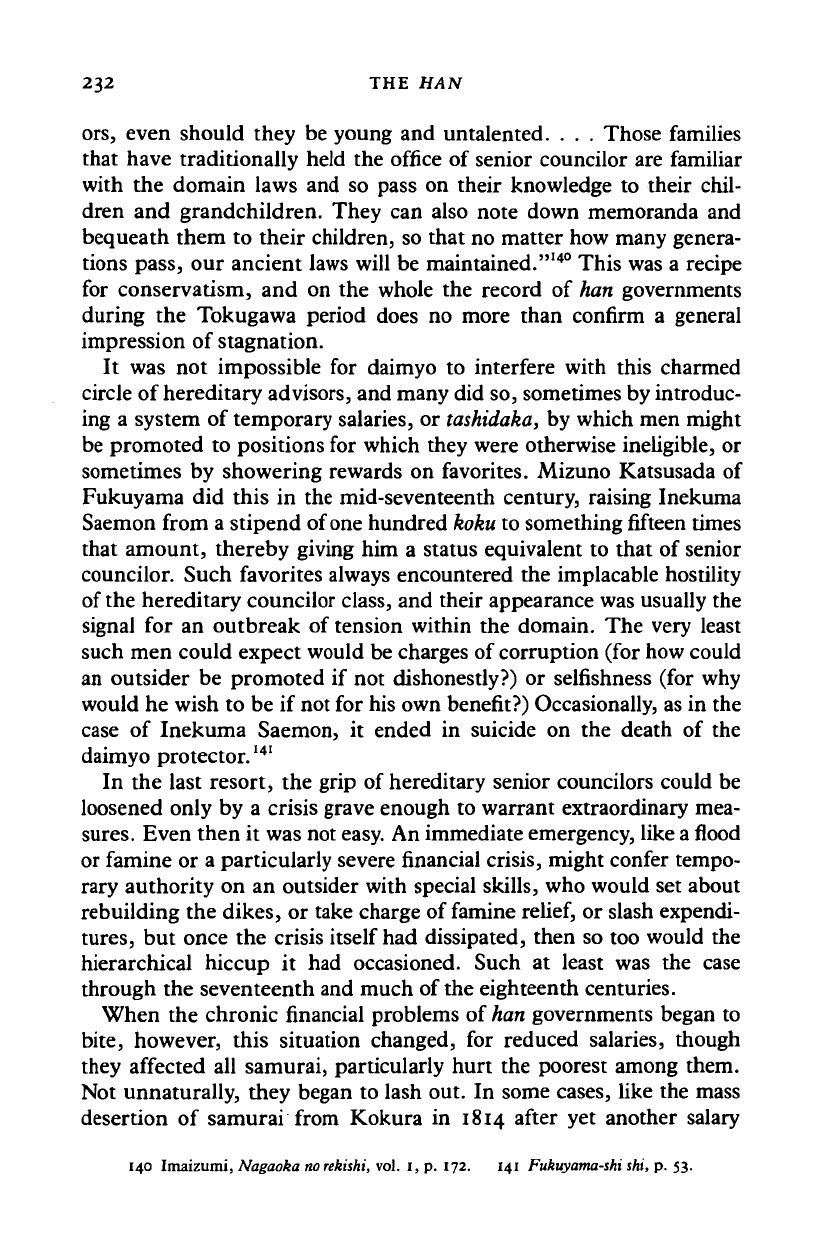
232 THE HAN
ors,
even should they be young and untalented. . . . Those families
that have traditionally held the office of senior councilor are familiar
with the domain laws and so pass on their knowledge to their chil-
dren and grandchildren. They can also note down memoranda and
bequeath them to their children, so that no matter how many genera-
tions pass, our ancient laws will be maintained."
140
This was a recipe
for conservatism, and on the whole the record of han governments
during the Tokugawa period does no more than confirm a general
impression of stagnation.
It was not impossible for daimyo to interfere with this charmed
circle of hereditary advisors, and many did so, sometimes by introduc-
ing a system of temporary salaries, or
tashidaka,
by which men might
be promoted to positions for which they were otherwise ineligible, or
sometimes by showering rewards on favorites. Mizuno Katsusada of
Fukuyama did this in the mid-seventeenth century, raising Inekuma
Saemon from a stipend of one hundred
koku
to something
fifteen
times
that amount, thereby giving him a status equivalent to that of senior
councilor. Such favorites always encountered the implacable hostility
of the hereditary councilor class, and their appearance was usually the
signal for an outbreak of tension within the domain. The very least
such men could expect would be charges of corruption (for how could
an outsider be promoted if not dishonestly?) or selfishness (for why
would he wish to be if not for his own benefit?) Occasionally, as in the
case of Inekuma Saemon, it ended in suicide on the death of the
daimyo protector.
I41
In the last resort, the grip of hereditary senior councilors could be
loosened only by a crisis grave enough to warrant extraordinary mea-
sures.
Even then it was not
easy.
An immediate emergency, like
a
flood
or famine or a particularly severe
financial
crisis, might confer tempo-
rary authority on an outsider with special skills, who would set about
rebuilding the dikes, or take charge of famine
relief,
or slash expendi-
tures,
but once the crisis itself had dissipated, then so too would the
hierarchical hiccup it had occasioned. Such at least was the case
through the seventeenth and much of the eighteenth centuries.
When the chronic financial problems of
han
governments began to
bite,
however, this situation changed, for reduced salaries, though
they affected all samurai, particularly hurt the poorest among them.
Not unnaturally, they began to lash out. In some cases, like the mass
desertion of samurai from Kokura in 1814 after yet another salary
140 Imaizumi, Nagaoka
no
rekiski,
vol. I, p. 172. 141 Fukuyama-shi shi, p. 53.
Cambridge Histories Online © Cambridge University Press, 2008
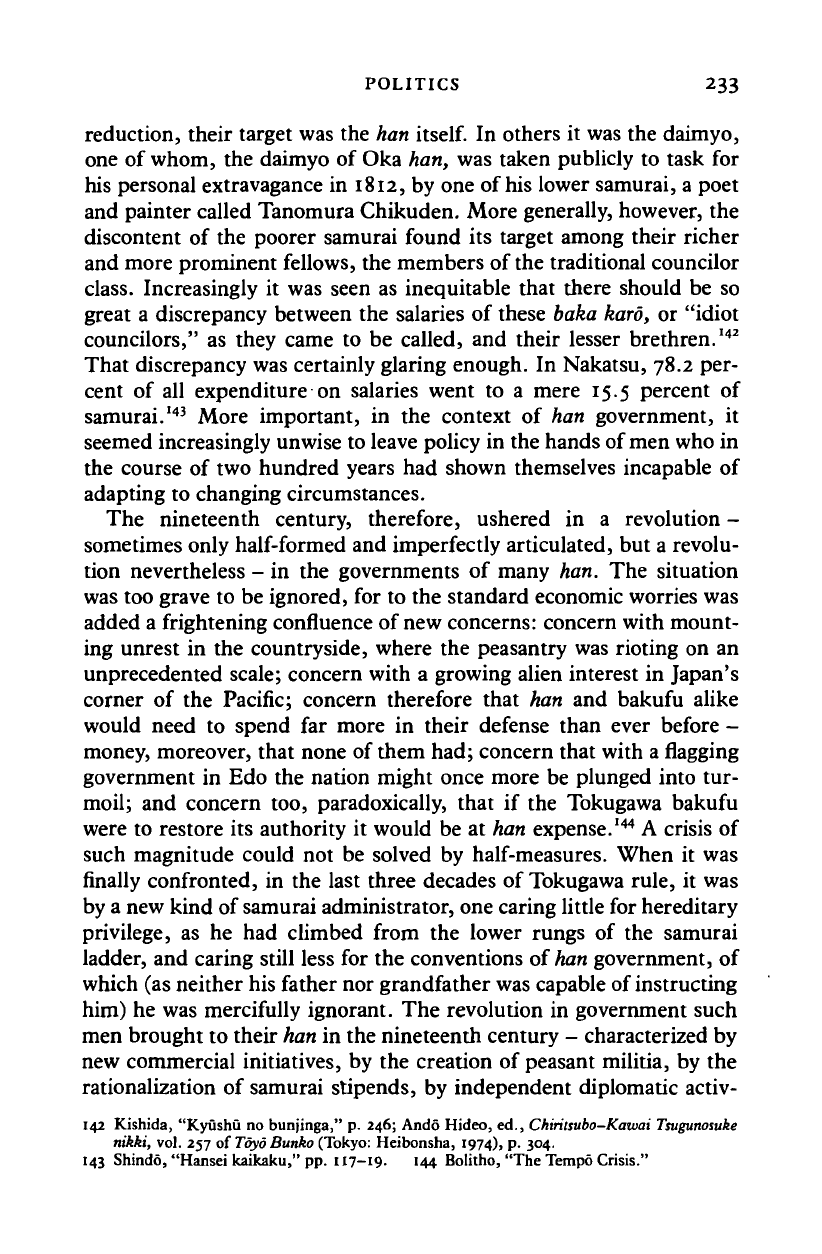
POLITICS 233
reduction, their target was the han
itself.
In others it was the daimyo,
one of whom, the daimyo of Oka han, was taken publicly to task for
his personal extravagance in 1812, by one of
his
lower samurai, a poet
and painter called Tanomura Chikuden. More generally, however, the
discontent of the poorer samurai found its target among their richer
and more prominent fellows, the members of the traditional councilor
class.
Increasingly it was seen as inequitable that there should be so
great a discrepancy between the salaries of these baka
karo,
or "idiot
councilors," as they came to be called, and their lesser brethren.
142
That discrepancy was certainly glaring enough. In Nakatsu, 78.2 per-
cent of all expenditure on salaries went to a mere 15.5 percent of
samurai.
143
More important, in the context of han government, it
seemed increasingly unwise to leave policy in the hands of men who in
the course of two hundred years had shown themselves incapable of
adapting to changing circumstances.
The nineteenth century, therefore, ushered in a revolution -
sometimes only half-formed and imperfectly articulated, but a revolu-
tion nevertheless - in the governments of many han. The situation
was too grave to be ignored, for to the standard economic worries was
added a frightening confluence of new concerns: concern with mount-
ing unrest in the countryside, where the peasantry was rioting on an
unprecedented scale; concern with a growing alien interest in Japan's
corner of the Pacific; concern therefore that han and bakufu alike
would need to spend far more in their defense than ever before -
money, moreover, that none of them had; concern that with a flagging
government in Edo the nation might once more be plunged into tur-
moil; and concern too, paradoxically, that if the Tokugawa bakufu
were to restore its authority it would be at han expense.
144
A crisis of
such magnitude could not be solved by half-measures. When it was
finally confronted, in the last three decades of Tokugawa rule, it was
by a new kind of samurai administrator, one caring little for hereditary
privilege, as he had climbed from the lower rungs of the samurai
ladder, and caring still less for the conventions of
han
government, of
which (as neither his father nor grandfather was capable of instructing
him) he was mercifully ignorant. The revolution in government such
men brought to their
han
in the nineteenth century - characterized by
new commercial initiatives, by the creation of peasant militia, by the
rationalization of samurai stipends, by independent diplomatic activ-
142 Kishida, "Kyushu no bunjinga," p. 246; Ando Hideo, ed., Chiritsubo-Kawai
Tsugunosuke
nikki, vol. 257 of
Toyo
Bunko (Tokyo: Heibonsha, 1974), p. 304.
143 Shindo, "Hansei kaikaku," pp. 117-19. 144 Bolitho, "The Tempo Crisis."
Cambridge Histories Online © Cambridge University Press, 2008
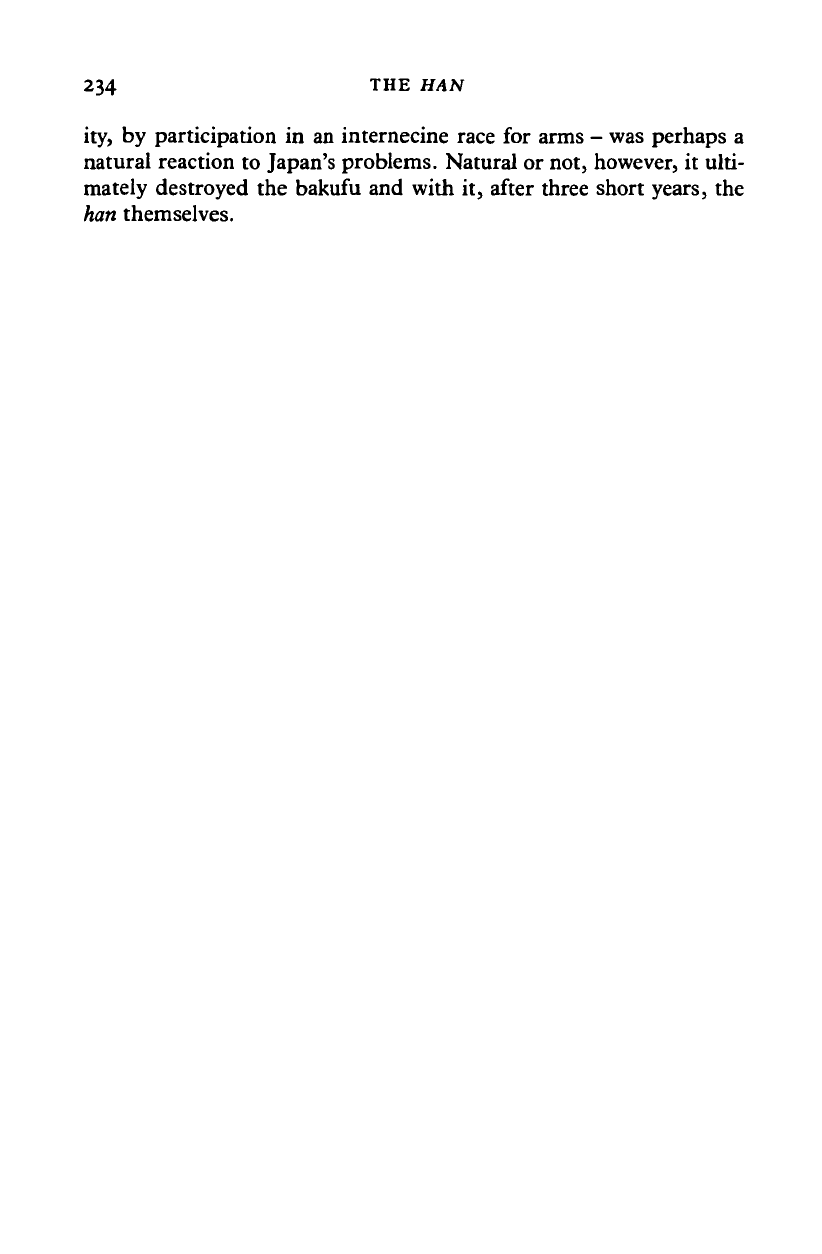
234
THE
ity, by participation in an internecine race for arms - was perhaps a
natural reaction to Japan's problems. Natural or not, however, it ulti-
mately destroyed the bakufu and with it, after three short years, the
han themselves.
Cambridge Histories Online © Cambridge University Press, 2008
